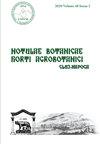Worldwide cotton production and trade during COVID-19 pandemic: An empirical analysis for a three-year observation
IF 1.3
4区 生物学
Q3 PLANT SCIENCES
引用次数: 0
Abstract
The COVID-19 pandemic has posed a significant impact on agriculture. Due to its importance in world trade and human life, the effects of the pandemic on the cotton economy were evaluated by using the data of important organizations such as the U.S. Department of Agriculture, the World Trade Organization, and International Cotton Advisory Committee in this study. With the Chow test, which measures of structural breaks, the effects of COVID-19 on cotton production and trade were examined. According to the Chow test results, the pandemic had no significant effect on cotton production, exports and imports in the People’s Republic of China and Türkiye, while being highly influential on cotton production and exports in the U.S. and Brazil. Distinctively, in Pakistan, it had a significant impact on cotton production and import. It was observed that although the demand, trade and prices for cotton were descended, the cotton prices started to recover with the increase in demand in the third quarter of 2020. In June 2022, the highest peak in cotton prices was observed. As a conclusion, it is shown that cotton production and trade during the pandemic were affected in all countries except People’s Republic of China and Türkiye. However, the marks of the effects of factors such as decreasing stocks, uncertainties in national economies, high inflation and increase in production costs on the cotton economy will be better understood in the coming years.COVID-19 大流行期间的全球棉花生产和贸易:三年观察期的实证分析
COVID-19 大流行对农业产生了重大影响。由于棉花在世界贸易和人类生活中的重要性,本研究利用美国农业部、世界贸易组织和国际棉花咨询委员会等重要机构的数据,评估了大流行对棉花经济的影响。通过衡量结构断裂的 Chow 检验,考察了 COVID-19 对棉花生产和贸易的影响。根据周氏检验结果,疫情对中华人民共和国和土耳其的棉花生产、出口和进口没有显著影响,而对美国和巴西的棉花生产和出口影响很大。特别是在巴基斯坦,它对棉花生产和进口有重大影响。据观察,虽然棉花的需求、贸易和价格都有所下降,但随着 2020 年第三季度需求的增加,棉花价格开始回升。2022 年 6 月,棉花价格达到最高峰。综上所述,除中华人民共和国和土耳其外,所有国家的棉花生产和贸易都在大流行期间受到了影响。然而,库存减少、国家经济的不确定性、高通胀和生产成本上升等因素对棉花经济的影响将在未来几年得到更好的体现。
本文章由计算机程序翻译,如有差异,请以英文原文为准。
求助全文
约1分钟内获得全文
求助全文
来源期刊

Notulae Botanicae Horti Agrobotanici Cluj-napoca
PLANT SCIENCES-
CiteScore
2.70
自引率
0.00%
发文量
118
审稿时长
3 months
期刊介绍:
Notulae Botanicae Horti Agrobotanici Cluj-Napoca is a peer-reviewed biannual journal aimed at disseminating significant research and original papers, critical reviews and short reviews. The subjects refer on plant biodiversity, genetics and plant breeding, development of new methodologies that can be of interest to a wide audience of plant scientists in all areas of plant biology, agriculture, horticulture and forestry. The journal encourages authors to frame their research questions and discuss their results in terms of the major questions of plant sciences, thereby maximizing the impact and value of their research, and thus in favor of spreading their studies outcome. The papers must be of potential interest to a significant number of scientists and, if specific to a local situation, must be relevant to a wide body of knowledge in life sciences. Articles should make a significant contribution to the advancement of knowledge or toward a better understanding of existing biological and agricultural concepts. An international Editorial Board advises the journal. The total content of the journal may be used for educational, non-profit purposes without regard to copyright. The distribution of the material is encouraged with the condition that the authors and the source (Notulae Botanicae Horti Agrobotanici Cluj-Napoca or JCR abbrev. title Not Bot Horti Agrobo) are mentioned.
 求助内容:
求助内容: 应助结果提醒方式:
应助结果提醒方式:


